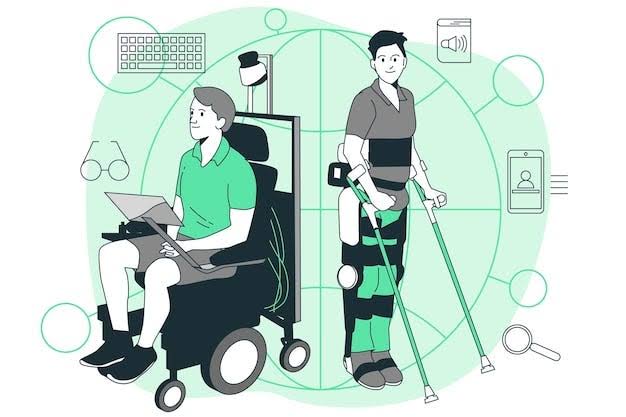Artificial Intelligence (AI) is changing healthcare by helping doctors diagnose, treat, and care for patients better. By 2025, AI tools are common in healthcare around the world. From predicting illnesses to creating personalized treatments, AI can make healthcare faster, cheaper, and better for patients. Learning about AI’s future in healthcare shows how it will keep improving medical care and solving health problems globally.
AI in Early Diagnosis and Predictive Medicine
One of the most promising applications of AI in healthcare is its ability to detect diseases early and predict potential health risks before they become critical.
- Medical Imaging and Diagnostics: AI algorithms analyze X-rays, MRIs, and CT scans with remarkable accuracy, often identifying subtle abnormalities that human eyes might miss.
- Predictive Analytics: Machine learning models predict disease progression by analyzing patient history, genetics, and lifestyle data.
- Cancer and Chronic Disease Detection: AI-based diagnostic tools can identify cancer cells, cardiovascular risks, and other chronic conditions faster than traditional methods.
By enabling early detection, AI helps reduce mortality rates and allows for proactive interventions.
Personalized Treatment and Precision Medicine
AI is driving the era of precision medicine, where treatments are customized to individual patients based on data-driven insights.
- Genomic Analysis: AI processes complex genetic information to determine a patient’s susceptibility to certain diseases.
- Tailored Therapies: Algorithms recommend medications or therapies based on a patient’s unique biological profile and response patterns.
- Adaptive Treatment Plans: AI continuously monitors treatment effectiveness and adjusts recommendations in real time.
Personalized medicine increases treatment success rates while minimizing side effects and unnecessary interventions.
AI-Powered Virtual Assistants and Telemedicine
The integration of AI with telemedicine platforms has made healthcare more accessible and efficient.
- Virtual Health Assistants: AI chatbots and voice assistants help patients schedule appointments, answer medical queries, and manage prescriptions.
- Remote Monitoring: Wearable devices integrated with AI track vital signs and send alerts for irregularities.
- Teleconsultations: AI-enhanced video consultations assist doctors in analyzing symptoms and medical history during virtual visits.
These technologies reduce hospital visits and provide continuous care, particularly for patients in remote areas.
AI in Drug Discovery and Development
AI is accelerating the traditionally slow and expensive drug discovery process.
- Data-Driven Research: AI analyzes vast datasets to identify potential compounds and predict drug efficacy.
- Clinical Trial Optimization: Algorithms select suitable participants and predict trial outcomes, increasing efficiency.
- Cost and Time Reduction: AI shortens the drug development cycle, bringing treatments to market faster.
This innovation is particularly vital in responding to global health emergencies, such as pandemics or rare diseases.
Improving Hospital Operations and Workflow
AI optimizes hospital management by streamlining administrative tasks and improving operational efficiency.
- Automated Scheduling: AI assigns resources, manages appointments, and reduces patient wait times.
- Resource Allocation: Predictive systems ensure the availability of critical equipment and staff.
- Medical Record Management: AI-powered systems organize and analyze electronic health records (EHRs) for faster access and decision-making.
By reducing administrative burdens, healthcare professionals can focus more on patient care.
Ethical and Regulatory Considerations
The future of AI in healthcare also raises ethical and regulatory challenges:
- Data Privacy and Security: Protecting sensitive patient information is crucial in AI systems.
- Bias and Fairness: AI algorithms must be trained on diverse datasets to avoid biased outcomes.
- Regulatory Compliance: Governments and health organizations are developing guidelines to ensure safe AI adoption.
Balancing innovation with patient safety and ethical responsibility will define AI’s role in healthcare.
Future Trends in AI Healthcare Integration
As technology advances, AI will become even more sophisticated and integrated into healthcare ecosystems:
- AI-Driven Surgery: Robotic-assisted surgeries with AI guidance will enhance precision and reduce recovery times.
- Predictive Public Health Systems: AI will analyze population health data to prevent outbreaks and manage healthcare resources.
- Integration with IoT and Wearables: Continuous real-time health monitoring will enable proactive medical interventions.
- Global Collaboration Platforms: AI-powered cloud systems will connect medical professionals and researchers worldwide for faster knowledge sharing.
Conclusion
The future of artificial intelligence in healthcare is transformative, offering unprecedented opportunities to improve patient outcomes, streamline operations, and revolutionize medical research. From early diagnostics and personalized treatments to predictive public health and robotic surgeries, AI is poised to become an essential partner to healthcare professionals. By addressing ethical, regulatory, and data challenges, the healthcare industry can fully harness AI’s potential to create a more efficient, accessible, and patient-centered system for the years ahead.



Interesting